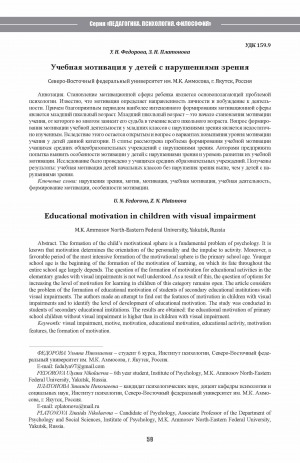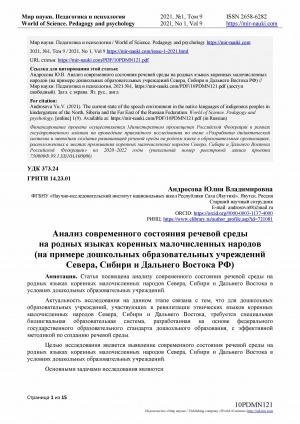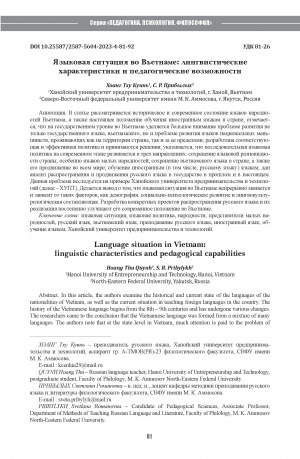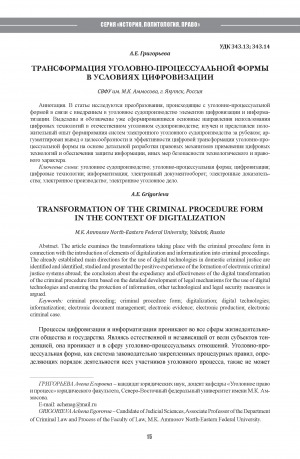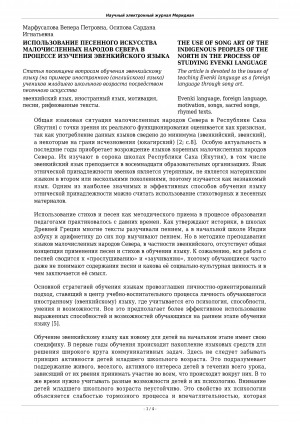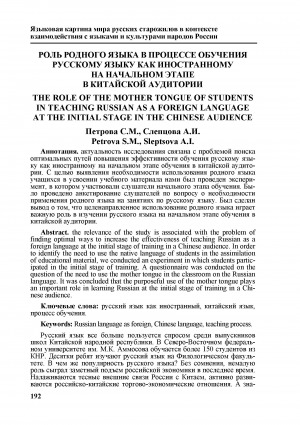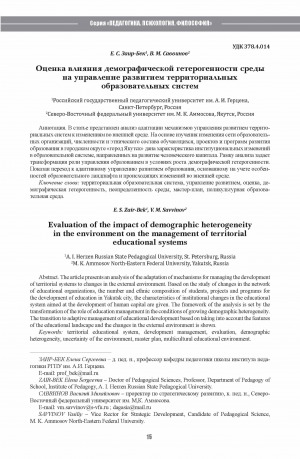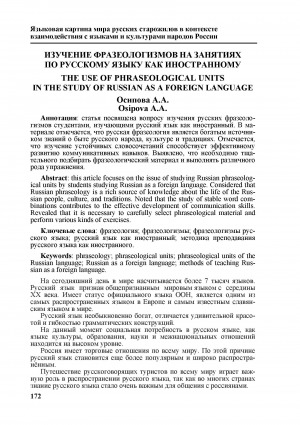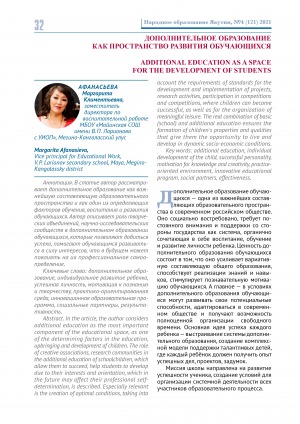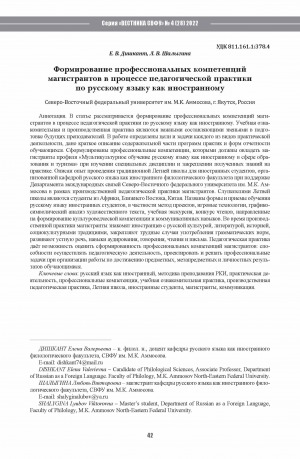The electronic educational environment as a means of individualization and differentiation of the learning process
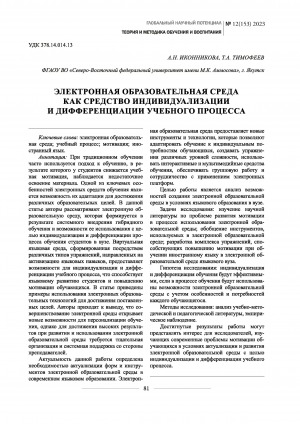
Электронная образовательная среда как средство индивидуализации и дифференциации учебного процесса
The electronic educational environment as a means of individualization and differentiation of the learning process
Статья в журнале
Русский
378.14.014.13:004
электронная образовательная среда; учебный процесс; мотивация; иностранный язык; electronic educational environment; educational process; motivation; foreign language
Народное образование. Педагогика / Общеобразовательная школа. Педагогика общеобразовательной школы / Методика преподавания учебных дисциплин в общеобразовательной школе
Глобальный научный потенциал: научно-практический журнал. – 2023. – 12 (153)
С. 81-84
Глобальный научный потенциал: научно-практический журнал
Санкт-Петербург, Издательский дом "ТМБпринт"
Основан в 2005 г.
Выходит ежемесячно
Журнал выпускается с 2005 года, адресуется научным работникам и специалистам, аспирантам и студентам, занимающимся исследованием функционирования и развития экономики, права, производства, теоретическими и прикладными научными вопросами в различных отраслях знаний. Журнал выпускается как в обычной сводной форме, так и в виде тематических выпусков по отдельным проблемам. Статьи публикуются на одном из 2-х языков: русском, английском и сопровождаются аннотациями на каждом из этих языков. Принимаются к публикации научные статьи, обзоры, краткие сообщения, дискуссионные материалы, письма в редакцию, а также серийные статьи, а при необходимости – отдельные расширенные препринты работ и диссертаций с публикацией в журнале их рефератов. Статьи проходят профессиональное рецензирование, тщательную научную экспертизу, после чего предоставляются на рассмотрение членам редколлегии. Основной задачей журнала является распространение на территории России, стран СНГ и дальнего зарубежья информации о научных разработках, проводимых учеными МОО "Фонд развития науки и культуры", формирование вокруг журнала научных школ и направлений, информационная поддержка приоритетных научных исследований. Журнал является периодическим изданием и издается 12 раз в год.
The journal has been published since 2005 and is addressed to researchers, professionals and students involved in the study of the functioning and development of economy, law, manufacturing, theoretical and applied research in the various fields of knowledge. The journal is issued in a conventional form and as thematic issues on specific problems. The papers are published in Russian and English with abstracts and keywords in both languages. The journal welcomes papers, reviews, brief reports, discussion papers, letters to the editor, as well as series of papers, and extended abstracts and preprints of dissertations on request. Articles are reviewed by experts and submitted to the members of the editorial board. The main objective of the journal is to disseminate information about the scientific research conducted by scientists and leading specialists, scientific schools and directions, information support of the priority scientific research, popularization of scientific ideas on the territory of Russia, CIS and far-abroad. The founder of the journal Science Prospects is the NGO Foundation for the development of science and culture.
Журнал является рецензируемым, входит в систему РИНЦ
Глобальный научный потенциал : научный журнал / Межрегиональная общественная организация "Фонд развития науки и культуры" ; главный редактор О. В. Воронкова . - Санкт-Петербург : Межрегиональная общественная организация "Фонд развития науки и культуры", 2005–. ISSN 1997-9355. – 2023, Т. 1, N 12 (153) – 265 с.
In traditional teaching, an approach to teaching is often used, as a result of which students' motivation for learning decreases and insufficient mastery of the material is observed. One of the key features of electronic learning tools is the ability to adapt them to achieve various educational goals. In this article, the authors consider the electronic educational environment, which is formed as a result of the systemic implementation of hybrid learning and the possibility of its use for the purpose of individualizing and differentiating the learning process of students at a university. The virtual language environment, formed through various types of exercises aimed at activating language skills, provides opportunities for individualization and differentiation of the educational process, which contributes to the language development of students and increases the motivation of students. The article provides examples of the use of electronic educational technologies to achieve set goals. The authors come to the conclusion that improving the electronic environment opens up new opportunities for personalizing learning; however, to achieve high results in the development and use of the electronic educational environment requires careful organization and systematic support from teachers. The relevance of this study is determined by the need to update the forms and tools of the electronic educational environment in modern language education. The electronic educational environment provides new tools and technologies that allow you to adapt training to the individual needs of students, create exercises of various levels of complexity, use interactive and multimedia learning tools, and ensure group work and collaboration using electronic platforms. The purpose of the research is to analyze the possibilities of creating an electronic educational environment in the conditions of language education at a university. The research objectives include the study of the scientific literature on the problem of developing motivation in the process of using an electronic educational environment; generalization of tools used in the electronic educational environment; development of a set of exercises that help increase motivation when teaching a foreign language in the electronic educational environment of a language university. The research hypothesis is the assumption that individualization and differentiation of learning will be effective if the capabilities of the electronic educational environment are used in the learning process, taking into account the characteristics and needs of each student. The research methods are analysis of educational, methodological and pedagogical literature, empirical observation. The achieved results of the work may be of interest to researchers studying modern problems of student motivation in the context of the actualization and development of the electronic educational environment with the aim of individualizing and differentiating the educational process.
Иконникова, А. Н. Электронная образовательная среда как средство индивидуализации и дифференциации учебного процесса / Иконникова А. Н., Тимофеев Т. А. ; Северо-Восточный федеральный университет им. М. К. Аммосова // Глобальный научный потенциал. - 2023. - Т. 1, N 12 (153). - С. 81-84.
- Общий отдел > Информационные технологии. Вычислительная техника,
- Общественные науки. Образование > Народное образование. Воспитание. Обучение. Организация досуга > Высшее образование. Высшая школа. Подготовка научных кадров,
- НАУКА ЯКУТИИ > ОБЩЕСТВЕННЫЕ НАУКИ > Народное образование. Воспитание. Обучение. Организация досуга > Высшее образование. Высшая школа. Подготовка научных кадров,
- НАУКА ЯКУТИИ > ОБЩИЙ ОТДЕЛ > Информационные технологии. Вычислительная техника.
Чтение документа возможно в помещении библиотеки
